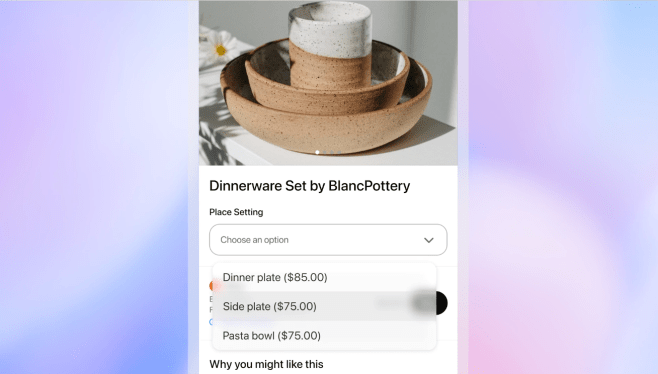ChatGPT users in the United States can now purchase items from Etsy and Shopify directly within their conversations. This development represents a significant step forward for the future of online shopping, impacting both consumers and the platforms that manage product discovery, recommendations, and payments. Essentially, OpenAI may be on a path to reshape where power resides in the e-commerce landscape.
This new “Instant Checkout” feature is available to all logged-in ChatGPT users, including those on Free, Pro, and Plus plans, when buying from U.S.-based Etsy sellers. OpenAI has also announced that over one million Shopify merchants, including major brands like Glossier, Skims, Spanx, and Vuori, will be integrated soon.
The feature builds upon previous ChatGPT shopping capabilities that allowed the AI to surface relevant products, images, reviews, prices, and links to merchants in response to user queries. Users could ask questions like “what should I get my friend who loves ceramics?” or “best sneakers to wear to the office.” Now, instead of being redirected to an external site, users can simply tap a “Buy” button to confirm their order. They can then enter their shipping and payment details directly within the chat, using options like Apple Pay, Google Pay, Stripe, or a credit card to complete the purchase.
This move toward frictionless shopping is not entirely unique. Last year, Perplexity introduced a similar in-chat shopping and payments feature for its Pro users. Microsoft also provides merchants with the ability to create in-chat storefronts through its Copilot Merchant Program.
This type of seamless experience has the potential to create a major shift in online shopping behavior. It could move consumer activity away from traditional search engines like Google and e-commerce platforms like Amazon and toward conversational AI agents that provide curated recommendations, product comparisons, and easy checkout.
It also sets the stage for new power brokers to emerge in e-commerce. Google and Amazon have long been the gatekeepers for retail discovery. If a significant number of purchases begin inside AI chatbots, the companies behind these AI systems will gain considerable control over which products are recommended to users and what commissions or fees are charged for transactions.
Both Amazon and Google have previously used their dominant market positions to favor their own products or preferred partners, actions that have pushed down competitors in search results or required sellers to pay steep fees to maintain visibility. OpenAI states that the product results it surfaces are organic and unsponsored, ranked purely on relevance to the user. The company also notes it will charge merchants a small fee for each completed purchase.
Alongside the launch of in-chat checkout, OpenAI announced it will open source its Agentic Commerce Protocol, or ACP. This is the technology, built in collaboration with Stripe, that powers the Instant Checkout feature. By open sourcing it, OpenAI allows other merchants and developers to integrate this agentic checkout capability into their own systems.
A statement from Stripe’s president of technology and business emphasized that the company is building the economic infrastructure for AI, which involves re-architecting commerce systems and creating new AI-powered experiences.
While some users may be hesitant to provide payment information to ChatGPT, the company clarifies that orders, payments, and fulfillment are all handled directly by the merchant using their existing systems. ChatGPT acts solely as an agent, an intermediary that securely passes information between the user and the merchant.
Open sourcing ACP makes it easier for merchants to connect with ChatGPT, which widens the adoption of AI chatbots as virtual storefronts. This expansion also increases OpenAI’s potential influence as a gatekeeper for retail discovery and checkout. It could position the firm as the de facto architect of the AI commerce ecosystem.
This potential role would put OpenAI in tension with Google once again. The tech giant has recently launched its own open protocol for purchases initiated by AI agents, called the Agent Payments Protocol.

